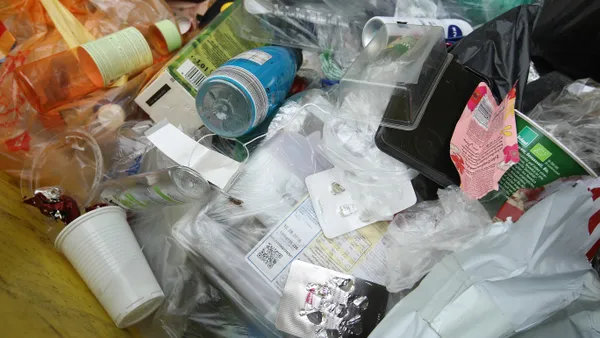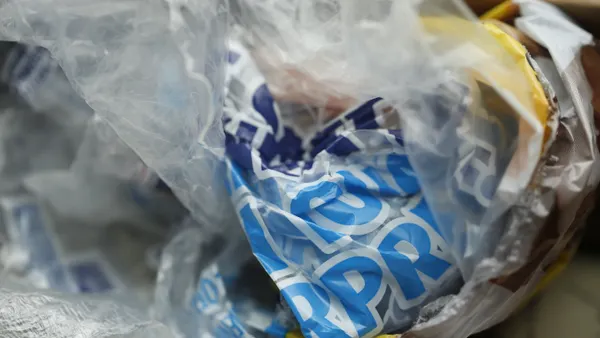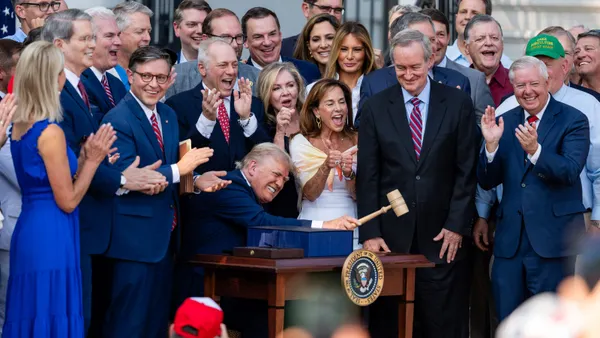Dive Brief:
- Waste Connections has reported $1.176 billion in revenue for the second quarter of 2017 — when factoring in Progressive Waste Solutions assets — up from $727.6 million last year. The increase was driven by improved commodity prices, growth in their E&P business and higher landfill volumes. Solid waste price plus volume grew by 5.1%, exceeding quarterly expectations.
- The company's volume growth occurred across multiple categories, with a continuously strong showing in their western business. These numbers may be tempered by new permit requirements at the Chiquita Canyon Landfill in California that will reduce tonnage allowances — and add an estimated $15 million per year in costs. "Thank God, there's only one California in the nation, and beyond that, thank God, there's only one Los Angeles, because there couldn't be a worse political governmental communist environment in the nation," CEO Ron Mittelstaedt said during the earnings call, when asked whether this could happen at other sites. "We've never had [a situation like Chiquita Canyon] in the history of our landfills and we won't have another one."
- Waste Connection executives saw more positive signs in the fact that they don't expect China's recently announced scrap import ban to have serious effects on their business, though cautioned that commodity markets are naturally unpredictable. Mittelstaedt also said Waste Connections is in negotiations with "several" companies about potential acquisitions and has extended offers to more than "a dozen" others. "Looking at acquisition activity, this is, without a doubt, the most active deal environment we've seen in over 15 years," he said.
Dive Insight:
Waste Connections has seen a streak of positive quarters due in part to last year's Progressive acquisition and that has made them confident enough to increase revenue outlooks for 2017. As described in the call, this has been helped along by double-digit landfill volume growth, big improvements in commodity prices over last year and strong demand on routes around the country. Aside from comments about a tight labor market, the Chiquita permit was one of the few negative factors mentioned about their prospects moving forward.
The permit terms referenced by Mittelstaedt were finalized by the Los Angeles County Board of Supervisors last month. Residents have long advocated for the site's closure. Waste Connections has pushed back on this local opposition and will now be allowed to operate for an additional 30 years, unless it hits capacity before then. Under new terms that take effect August 1, Waste Connections will have to accept less material, pay new fees, and fund a range of environmental and community projects. Mittelstaedt said that while the volume displacement is an issue, the additional fees are what irk him the most. He described them as a "pure tax grab by the county."
While this will put a dent in some of their progress, the Waste Connections team was bullish about their future growth plans. The team gave an update on their asset reshuffling following the Progressive deal, saying that in total they will end up divesting more than $100 million in revenue by selling or swapping assets in select markets. This included exiting the Washington, D.C. market and swapping assets in Lee County, Florida for others in Charlotte, North Carolina.
CFO Worthing Jackman described M&A spending as the "highest and best use of capital," adding that it's where the company will be "directing our firepower." Waste Connections already started the year strong on that front by picking up Illinois-based Groot Industries in January. Mittelstaedt hinted at the pending acquisition of a new $15 million revenue West Coast company in September. He described enough potential for both tuck-in and larger deals, more in the U.S. than Canada, for years to come. Rising interest rates and recent political changes were described as some of the more helpful factors in creating these opportunities. Mittelstaedt expressed some optimism following the Obama administration, and alluded to new possibilities under President Trump.
"I think people feel that their business has now fully recovered and gotten back to, and maybe above where it was prior to the recession," Mittelstaedt said. "I think they think there may be a change in taxes, but recent activity has told them there may well not be, and they fear that a regime change in perhaps three years could mean just higher taxes."
Earlier in the year, executives from Waste Connections and other competitors were speaking in more specific and optimistic terms about what the Trump administration could mean for their businesses. Tax reform and an infrastructure plan were often cited as the two top priorities. As the year drags on in a chaotic fashion, it's become less certain that either of those plans will be happening in the near-term. Though based on recent comments from industry executives, it would appear that the Trump administration's regulatory approach and business-friendly stance is still seen as helpful for however long it lasts.










